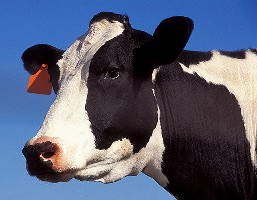31 October 2014. Tests by Avivagen Inc. show an ability of beta-carotene to spontaneously oxidize that offers a natural alternative to antibiotics added to livestock feed to reduce illness and gain weight. The researchers from Avivagen, an animal health products company in Ottawa, Canada and National Research Council of Canada published their findings in today’s issue of the online journal PLoS One.
Antibiotics fed to livestock for other than therapeutic reasons are considered a factor in increasing resistance to antibiotics in humans, thus posing a threat to public health. A 2013 report on antibiotic resistance from Centers for Disease Control and Prevention says, “The use of antibiotics for promoting growth is not necessary, and the practice should be phased out.” Food and Drug Administration later that year wrote voluntary guidelines for industry on antibiotic use in food-producing animals.
Avivagen makes natural health products for pets and food animals, including those based on an oxidized form of beta-carotene, a food source of vitamin A and antioxidants. The oxidized beta-carotene, called OxC-Beta, was found by Avivagen and other researchers to have potentially beneficial properties for animals, including higher quantities of oxygen — some 8 molecules of oxygen per molecule of beta-carotene, from processes not related to vitamin A. These properties suggest OxC-Beta could be biologically active and help generate an immune response to pathogens or inflammation.
The paper investigates the biochemical properties of oxidized cartenoids, the name given to substances like beta-carotene, and tests their effects in the lab on indicators of animals’ immune functions. One property not yet been fully understood is the ability of oxidized cartenoids to form oxygen copolymer compounds. The researchers treated human blood and tissue cells with OxC-Beta, then subjected the copolymer compounds created by oxidized beta-carotene to fluorescence activated cell sorting or FACS analysis to measure immune system potential. The results show increased immune receptor levels on the treated cells, compared to the untreated cells.
The team also fed lab mice with OxC-Beta and tested their intestinal tissues for expression of genes related to the immune system. The findings show higher expression of CD14 and TLR4 genes, associated with activation or regulation of the innate immune system, providing an immediate response to invading pathogens. The results also show increased activity of immune system cytokine and phagocyte cells, when pretreated with OxC-Beta, compared to untreated cells.
The researchers believe the development of oxygen copolymers by oxidized beta-carotene also applies to other cartenoids, which suggests this potential boost for the immune system can be replicated in other cartenoid-rich fruits and vegetables.
Read more:
- Inappropriate Antibiotic Use Costing U.S. $163 Million
- U.S. Diet Quality Improves, But Still Not Healthy
- Big Data Quickly Identify Foodborne Illness Sources
- Trial Shows Single-Dose Antibiotic Effective with MRSA
- School Meal Standards Lead to More Fruit, Veggies Eaten
* * *


 RSS - Posts
RSS - Posts
You must be logged in to post a comment.